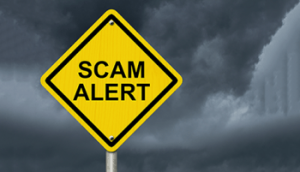Content Reviewed by: Dave Gormley •
November.29.2017 Vertified Content
Nov 29, 2017 | Read Time: 7 minutes

If you just know what to look out for, you can avoid a lot of holiday related scams.
And you may be able to avoid even being targeted by scammers. They usually prey on the unsuspecting. If you read this post, you won’t be so unsuspecting anymore.
Here are some of the top scams to watch out for this holiday season:
Article Contents
Research That Charity
Maryland has an easy way to check up on a legitimate charity through the Maryland Secretary of State’s Office Charitable Organization Division.
The Maryland Solicitations Act requires all charities soliciting donations in Maryland to register and file certain documents regarding their finances. You can look up any legitimate Maryland charity on the Secretary of State’s website.
If they are not listed there, you should be very careful about donating to them.
The only exceptions to the registration requirements are religious organizations, and those that solicit only from their own members.
However, because the registration requirement is so easy for any charity, there is really no excuse for a charity not to be registered. Unless you are really sure who is behind it, don’t give to an organization not on that list.
If the charity you are giving to is registered with the Better Business Bureau, you can check them out on their website by following this link to their Wise Giving Aliance. That will tell you more than a dry government required filing form will tell you.
Another good place to check out a charity is through a private entity called charitynavigator.org. They only list valid charities, and they provide information as to how much of your donation will go to overhead versus real programs.
As a general rule of thumb, don’t give to an organization that uses more than 25% of its donations for overhead.
Door to Door Solicitations
There are many good organizations that come and ring your doorbell. Unfortunately, there are also many phonies who do the same thing. They may wear uniforms, dress like Santa, have badges that look official, and have fake documents.
Our advice is this – do not hand these people cash.
You should take the information about the charity and mail a check – after you do your research to make sure it is a legitimate charity.
Also, take the solicitors information. Get their name, their business number, and take a picture of them with your cell phone. If they are legit, they won’t mind that.
If some door to door solicitor doesn’t want their picture taken, you should be very suspicious.
Fire Departments
In Charles County and St. Mary’s County, we rely on local volunteer fire departments to save our lives in an emergency. They get a lot of their money through Christmastime donation drives. Often, they go door to door.
Unfortunately, some unsavory characters have taken advantage of that in the past, and may do so in the future.
Several years ago, some guy claiming to be affiliated with one of the volunteer fire departments was getting cash donations and pocketing the money.
He went to jail.
If someone shows up at your door claiming to be from the local fire department, check his or her credentials, and get a receipt.
If you feel uneasy about it, call the fire department (the local number – not 911) to ask about the person. In any event, don’t give them cash. If you are really convinced they are legitimate, write a check. Or go online and donate by credit card.
Don’t give cash.
Beware a firefighter charity with a general sounding name. In Montana this year, an organization called the Firefighters Support Foundation sent mailers to thousands of people. They were a fake organization with a catchy sounding name. They formed an actual organization, so even if you wrote a check it didn’t protect you. They simply cashed the checks and pocketed all the money.
Telemarketers
This is a very busy time of year for cold calls from telemarketers soliciting charitable donations. Even if you are on the Federal Do Not Call list, you could get a call from a charity. They are exempt from the requirements of the Do Not Call law.
So how do you know if they are real or fake when they call?
Unfortunately, there really is no way to know. They could lie about who they are. They could spoof their caller ID to look like they come from the real charity. They could use a name very similar to a charity you know well.
Our best advice is to never give money to a telemarketer who cold calls you. If you are moved by their sales pitch, and want to help their organization, you can still make the donation. Just do it by mail or on the internet.
Whatever you do, don’t give your credit card number over the phone. It’s too risky.
Say No To Requests for your Social Security Number
There is no reason to give your social security number to a charity. They don’t need it.
But some legitimate charitable organizations have inadvertently given out their donor’s social security numbers when they file forms with the IRS listing their sources of income. An identity thief can access these forms (which are public records) and get your social security number if you gave it up.
Don’t do it. Just don’t.
Package Delivery Telephone Bill Trick
Say you aren’t there to get your package, and you get a note telling you to call a number and make arrangements for pick up. You call the number and sit on hold, possibly listening to Christmas music, for several minutes before you hang up.
Then you get a several hundred dollar charge on your next phone bill for calling some premium pay line in Singapore or China.
Double check the names of companies and their phone numbers before you call. If the phone number is not local, or starts with something other than 800, 888, 877, 866, 855 or 844 (the FCC’s designated toll free numbers), don’t call it. It is probably a scam.
Internet Shopping Scams
If you see a website offering prices that look too good to be true, they probably are. It is easy to set up very professional looking websites with pictures, logos and testimonials that lead you to think it is a legitimate online store.
If you give them your credit card information, you will lose your money but never see the item! You should only buy from a name you know and trust, and you should look up information for any on line store you haven’t heard of before.
If they are legitimate, there will be other online references to them.
Often, the number one give away here is the price of the item. These scammer websites aren’t trying to quote a reasonable price. They want you to think you saved a bundle and found the best deal out there. So their prices are very low – almost absurdly so. Beware of unbelievable deals!
Pickpockets
An oldy but a goody!
Just a little bump in all the hustle and bustle of holiday shopping, or a distraction from an associate, can mean you later find out you lost your wallet, keys, or cell phone. By then, the perps will be long gone. They could also lift items right out of your shopping bags.
Here are some tips:
- Keep your purse closed, and keep your hand on it.
- Keep your wallet in a closed compartment or in a front pocket – not a more easily accessible back pocket.
- Return to your car when you get too many bags. Store them in the trunk or out of sight.
- And if some stranger asks for your attention, watch for your valuables first before talking to them.
- Grab your bags and purse close if you think somebody is distracting you.
Shortchanging
Check your change at the register before you leave. It is easier to get shortchanged by an unscrupulous checkout clerk if there is a long line and everyone is impatient.
Have a good idea of the total price you will pay so you can be alert if they ring up the bill too high. If you pay with a larger bill, be sure they don’t give you the wrong change with too many smaller bills. Be very wary if they say you paid with a smaller bill than you had in your hand. Some cashiers use sleight of hand to play that trick.
Paying with credit card is often better than cash in these situations.
Package Theft
This is the time of the year to get packages on your doorstep. There are documented cases where thieves followed a delivery truck into a neighborhood and took packages right off people front stoops.
It is far better to have a place for packages that is out of sight, although we know this can be tricky.
Most delivery companies send email confirmations and let you track your package. Do that to be sure you can quickly report a theft if it occurs, and get a replacement.
Ticket Forgery
Want to see a show this holiday season? So do a lot of people. And ticket forgers are more prominent now because of it.
Be very careful of bogus tickets. Buy from a reputable source. Check out the source on line for other references or reviews.
Just like with bogus shopping websites, the giveaway is often the absurdly low price. Be very careful of super low bargain prices on any live show or event. If it looks too good to be true, it probably is.
Conclusion & Next Steps
We cannot list every holiday scam out there. This post would never end! We hope that by opening your eyes we have made your holiday a little safer, a little less prone to scams, and therefore a little more happy.
Want to know more? Discover what you need to know about Maryland law. Click here to see our Free Legal Consumer Guides and get answers to your questions today.
Know your options. Be informed. Protect yourself.
Need an attorney? Please contact us for a consultation today if you need an experienced lawyer in Waldorf and Lexington Park for your legal case.
Like our blog? Subscribe to our email newsletter and stay informed!











